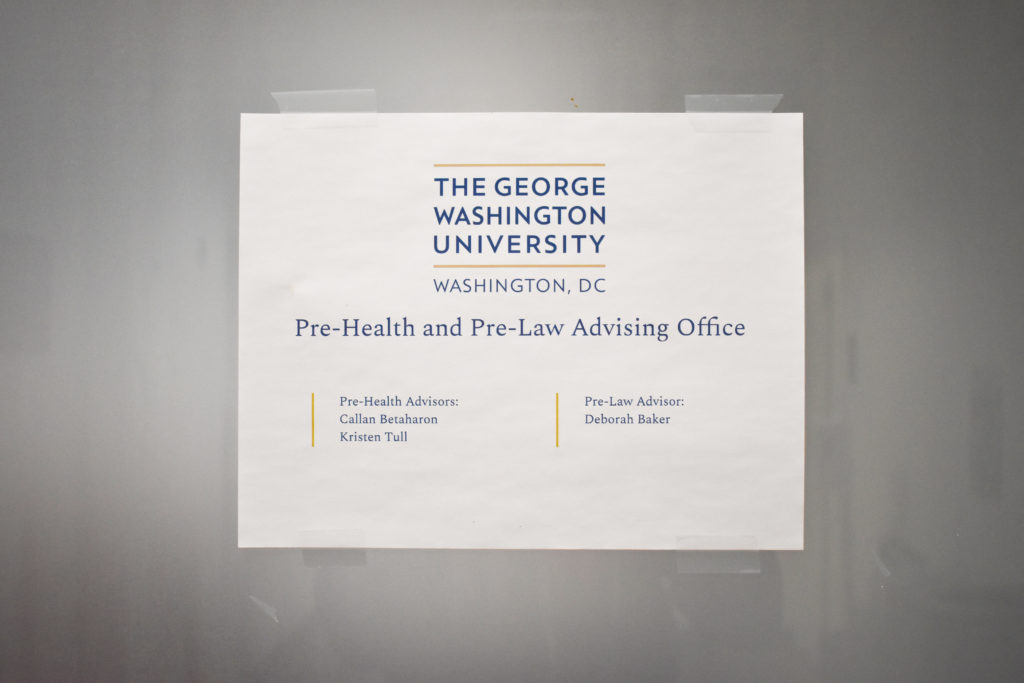Since the debut of the pre-law ambassadors program last year, four student ambassadors have served as liaisons between the pre-law advising office and students.
Ambassadors have worked to advise students who are considering a law degree by providing advice and mentorship based on their experience with the pre-law process, administrators said. They added that the ambassadors have provided student perspectives on pre-law advising matters like advising policies and promoted pre-law advising events to students through social media and the office’s website.
Deborah Baker, the senior academic adviser for pre-law students, said student ambassadors have been helpful in publicizing pre-law advising events, like admissions fairs arranged by the advising office. She said they serve as a “relatable resource” for students to go to with questions about their experiences as pre-law students.
“Peer advising is an extremely effective resource for many students,” she said in an email. “The ambassador program allows students to interact with peers who share a common interest in pursuing a legal career.”
Officials in the advising office of the Columbian College of Arts and Sciences sought to hire three to five undergraduate upperclassmen last spring to serve as ambassadors for this academic year to promote workshops, events and advising services.
She said four students have been serving in the roles since the program began in spring 2019, but one is currently inactive because she is studying abroad this semester.
Baker said pre-law ambassadors helped advertise the Law School Fair, one of the “biggest” programs organized by the advising office. The Law School Fair is an opportunity for students interested in attending law school to meet with admissions representatives from law schools around the country, according to the fair’s website.
“They participate in the promotion of events through posts on social media, placement of posters and flyers, website management, the use of live social networks like sororities, student organizations and club memberships,” Baker said.
She said advising officials have had difficulty determining the effectiveness of the pre-law ambassadors program in increasing the use of advising services because the program was part of “several changes” implemented in the advising office in the past year.
No additional funding was provided to the advising office for this program, Baker said.
Advising experts said the program can provide students who are considering law school with relatable mentors who can help students determine which legal issues interest them the most.
Carrie Russell, the director of pre-law advising at Vanderbilt University, said there are benefits and disadvantages to an undergraduate student ambassador program geared toward law school admissions. Students can provide peers with help on the application process, but the ambassadors have not completed law school and have not completed the application process and are therefore limited in that regard, she said.
Russell said current law students might serve as better ambassadors than undergraduates because undergraduate student ambassadors can struggle to provide certain types of help to pre-law students seeking their advice, given that they have not been through law school. She said ideal mentors could also include law school alumni or faculty.
“If a university has both undergraduate students and law students, that could be a good partnership to foster for mentoring purposes,” she said in an email.
Russell said pre-law students can also benefit from hearing from people who have been through law school to understand what admissions officials prioritize and “prime the students for what a first-year law student actually experiences.”
“Applicants need to know law school is not an extension of undergrad,” she said. “It’s a totally different ball game with different players, tools and different rules.”
Diane Curtis, the director of pre-law advising at the University of Massachusetts Amherst, said students may feel more comfortable asking upperclassmen for advice and sharing their struggles with them instead of with their current professors.
“Students hear things different from different people,” she said. “I could give some information about law school and the application process and an upperclassmen or postgraduate could give the same information, but it’s going to resonate with them differently.”
Curtis said students respond to advising from different sources in different ways, and there is no one method of advising that works best for everyone. She said events like information sessions and alumni events can help connect students to mentors and educate them about the application process.
“Law students are better than anybody else at giving an idea of what law school’s like and what the transition has been like,” she said.
Curtis said that while law students are more prepared than others at “giving an idea of what law school’s like and what the transition has been like,” an ideal advising system should include a variety of perspectives for students to rely on for advice, from undergraduates to law students to faculty.
“If you can afford to have more people offering advice and different perspectives, that’s absolutely better,” she said.
Jared Gans contributed reporting.







